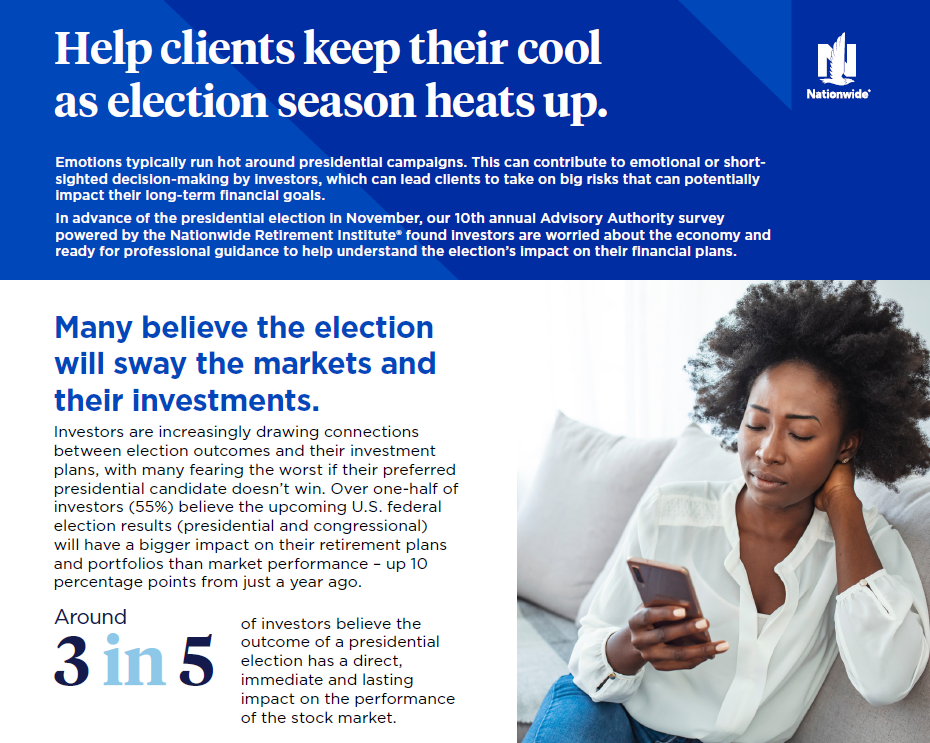Key takeaways:
- Economic concerns are weighing heavily on investors’ minds in the run-up to this year’s national elections.
- To help clients stay calm, reinforce the long-term historical track record of stock market performance as it relates to the outcome of elections.
- Many investors believe that working with a financial professional during an election year helps them feel more secure, regardless of who is elected in November.
10/15/2024 — The upcoming U.S. presidential and congressional elections will increasingly dominate the news cycle up until Election Day. It is also quite possible that the drama will continue for several weeks afterward, until all votes are counted. Heightened emotions will affect many investors, and with the potential for uncertainty and volatility, they are looking to financial professionals like you to provide sound guidance.
Our 10th annual Advisory Authority survey, powered by the Nationwide Retirement Institute®, found many investors are anxious about the outcome of this election, unsure what the results could mean for markets and their financial plans. The time is right to connect with your clients and help them resist the temptation to make emotional investing decisions and stay focused on their long-term financial plans.
What’s on investors’ minds as Election Day approaches?
Voters typically cite the economy as their primary issue for any upcoming election, and this year is no exception. When we asked investors what their biggest financial concerns are heading into the 2024 U.S. federal (presidential and congressional) elections, it’s not surprising that inflation topped the list—cited by 54% of investors surveyed. Recession fears and taxes also ranked high on their lists.
There is a lot of concern among investors about the direction the economy may take depending on the outcome of the election. We asked investors what outcomes they expect if the political party they least align with gains more power after the 2024 U.S. federal elections.
Here’s what they told us:
- 50% expect the cost of living will rise.
- 34% expect their taxes to increase within 12 months.
- 34% expect the economy to plunge into recession within 12 months.
It’s natural for investors to fear the worst if their preferred candidates or political party does not win. But this anxiety, which may or may not be based on a real potential outcome, can work against investors as they manage their portfolios or investment plans.
In reality, things are rarely as bad as people think they are when their candidate is on the losing end. The opposite is also true – things are rarely as good as people think when their preferred candidate wins.
Many investors may need this reality check in the weeks leading up to and after Election Day. It is important that all investors—no matter their political inclination—be aware of their emotional biases when making financial decisions. The objective guidance they get from you as a financial professional can make a big difference.

View the infographic
How will the election impact markets and investments?
When we conducted a similar survey about a year ago, less than half of investors (45%) said they believe the results of the U.S. federal election would have a bigger impact on their retirement plans and portfolio than market performance.
With Election Day now just weeks away, that number has gone up. Now over half of investors (55%) believe the election will have a bigger impact on their personal investment plans. In fact, 61% believe the outcome of a U.S. presidential election has a direct, immediate and lasting impact on the performance of the stock market.
But the historical data shows this is not likely to be the case. While the press may describe this year’s presidential race as “unprecedented,” it is more likely that history will repeat itself. Markets may experience temporary volatility around elections, but like most short-term news events, this volatility has little long-term impact on financial outcomes.
A recently updated white paper, “Investing in a Highly Politicized Climate,” examines the impact of different presidential administrations over the past several decades on investment markets. The verdict: when it comes to long-term investment outcomes, it really doesn’t matter to the markets which party controls power in Washington.
This does not mean electoral victories have no impact on the economy or people’s finances. Control of the presidency and Congress does influence what policies are put in place, especially around issues like taxation, federal spending and trade concerns. In some cases, these shifts may merit a discussion with clients about adjusting their long-term plans, helping to position them for success years or even decades down the road, but they are unlikely to be a good reason for a total change in investment strategy.
Finding common ground with financial guidance
Partisanship has long been part of our political landscape—it is a by-product of our country’s two-party political system. During election years, the partisanship tends to get more heated. And since the advent of the internet and social media, it seems the political divide has become worse.
One place Americans can find common ground is in financial professionals’ offices. Our survey found widespread support for objective financial guidance as a way to help moderate the emotions around election season. Across party lines, a majority of investors said that working with a financial professional during an election year helps them feel more secure, regardless of who is elected in November.
The good news is financial professionals are taking action to help their clients stay on track to meet their financial goals. For example, among the financial professionals we surveyed who have a strategy to protect their clients’ assets against market risks, we saw increased use of annuities, including fixed index and registered index-linked annuities, to help clients protect their assets against market risks.
Be the voice of calm during this emotional time
In the final days of this election campaign, you can help your clients stay calm. Especially for long-term investors, establishing a long-term plan or revisiting existing plans can help ensure clients remain aligned with their goals, which likely remain the same, regardless of who wins the election.
Here are a few tips that may be helpful to include in your client conversations over the next few months:
- Tune out the noise around the election from the media. It is important to stay informed, but the volume and dramatic nature of messages can create confusion and emotional reactions. Make sure you are putting a critical eye on the source of information you are consuming. There is plenty of partisan misinformation out there that may distract from the important facts that should be driving your voting and investing decisions.
- Stay focused on the fundamental drivers of investment performance. Company performance and underlying economic conditions, not election outcomes, create long-term investment opportunities. Actions by the Federal Reserve are likely to have more impact on investment returns than any individual political candidate or party.
- Remember that election results have historically had little impact on future investment returns. If we look back over several decades, there is no clear correlation between any particular political party’s control of government and stock market returns.


